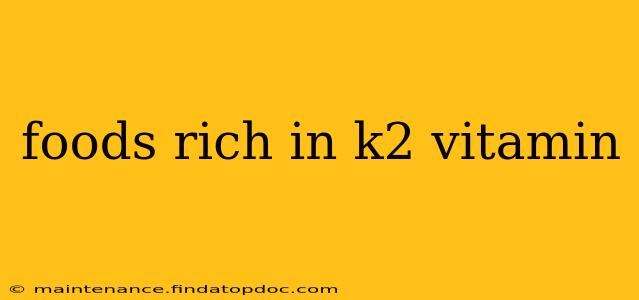Vitamin K2, a crucial nutrient often overshadowed by its cousin Vitamin K1, plays a vital role in maintaining bone health, cardiovascular health, and overall well-being. Unlike K1, which is primarily found in plants, K2 is produced by bacteria and found in certain animal products and fermented foods. Understanding which foods are rich in this essential vitamin is key to optimizing your health. This comprehensive guide explores the best sources of Vitamin K2, addressing common questions and concerns.
What are the best food sources of vitamin K2?
The best sources of Vitamin K2 are typically animal-based products and fermented foods. The amount of K2 varies depending on factors like animal diet and processing methods. Here's a breakdown of some top contenders:
-
Natto: This traditional Japanese fermented soybean dish is arguably the richest source of K2. Its high concentration makes it a powerhouse for this nutrient.
-
Chicken Liver: Organ meats, especially chicken liver, are excellent sources of Vitamin K2. However, it's important to consume these in moderation as part of a balanced diet.
-
Eggs: Both the yolk and white of eggs contain Vitamin K2, although the yolk generally contains a higher amount. Pasture-raised eggs are often considered to have a slightly higher concentration than commercially produced eggs.
-
Cheese: Certain cheeses, particularly aged cheeses like Gouda and Cheddar, contain noticeable amounts of Vitamin K2. The aging process contributes to the bacteria production that results in higher K2 levels.
-
Beef Liver: Similar to chicken liver, beef liver is another rich source of Vitamin K2.
What foods are high in vitamin K2 MK-7?
Vitamin K2 exists in various forms, with MK-7 (menaquinone-7) being the most extensively studied and readily absorbed form. While the exact MK-7 content can vary, foods like natto and certain fermented products are known to be particularly rich in this specific form. It's important to note that the specific form of K2 present in a food may impact its bioavailability (how well your body absorbs it).
Is there vitamin K2 in dairy products?
Yes, some dairy products contain Vitamin K2, although the amounts can vary considerably. Aged cheeses, as mentioned earlier, are generally better sources than fresh cheeses or milk. The fermentation process and aging contribute to higher K2 concentrations in these products.
What are the benefits of eating foods rich in vitamin K2?
The benefits of consuming sufficient Vitamin K2 are numerous and impactful. Key advantages include:
-
Bone Health: K2 plays a crucial role in activating proteins that help regulate calcium metabolism, ensuring calcium is deposited in bones instead of accumulating in arteries.
-
Cardiovascular Health: By directing calcium away from arteries, K2 helps prevent arterial calcification and promotes cardiovascular health.
-
Overall Health: Although research is ongoing, K2’s role in potentially reducing the risk of certain cancers and other health issues is also being explored.
How much vitamin K2 should I take daily?
There's no single universally agreed-upon recommended daily allowance for Vitamin K2. The optimal intake depends on several factors, including age, health status, and individual needs. Consulting with a healthcare professional or registered dietitian is recommended to determine your specific requirements. They can assess your dietary habits and overall health to provide personalized recommendations.
This guide offers a comprehensive overview of foods rich in Vitamin K2. Remember that a balanced diet incorporating a variety of these foods, along with consulting a healthcare professional, is crucial for maintaining optimal vitamin K2 levels and enjoying its associated health benefits. While supplements are available, focusing on a diet rich in naturally occurring K2 is always the preferred approach.
